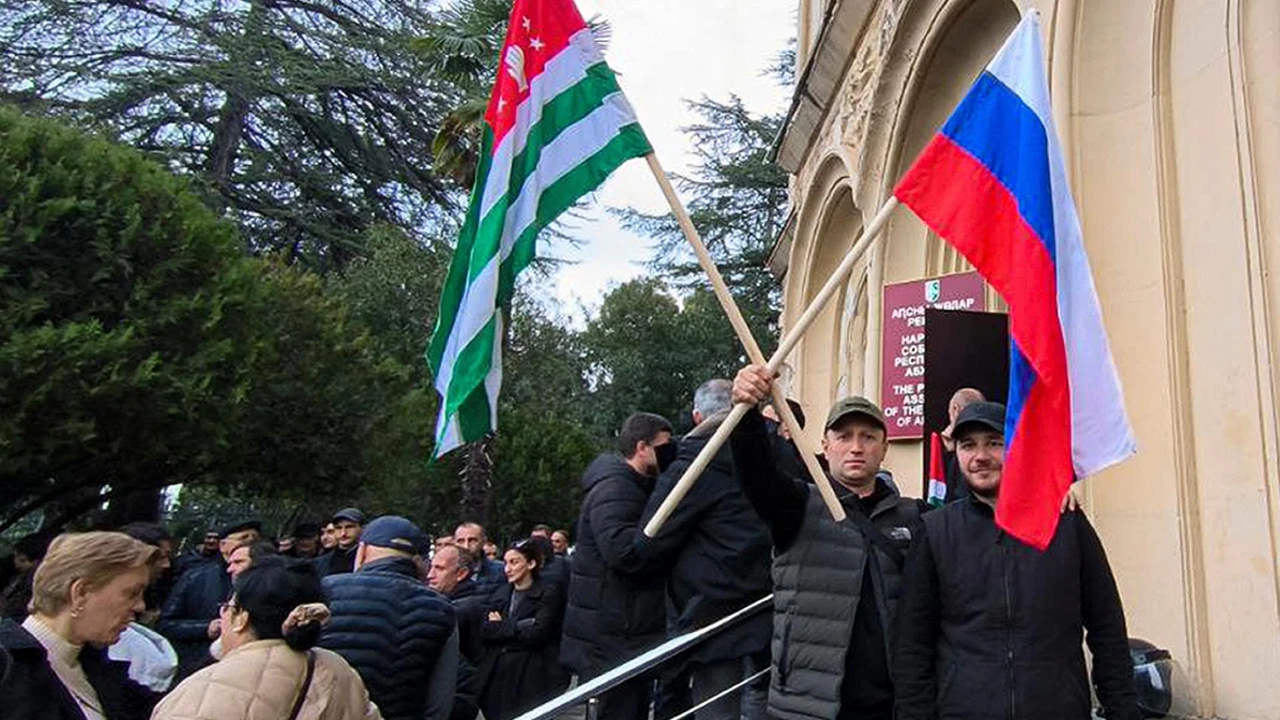Abkhazia’s leader resigns amid protests over Russian influence
 (AIASHARA Independent Agency via AP)
(AIASHARA Independent Agency via AP)
Abkhazia’s parliament has approved the resignation of its Russia-backed President Aslan Bzhania, after days of anti-government unrest, officials confirmed.
Bzhania stepped down earlier on Tuesday, citing the need to preserve “stability and constitutional order.” His resignation comes as part of a deal struck between government and opposition leaders, which also includes the resignation of Prime Minister Alexandr Ankvab and the withdrawal of protesters who had occupied government buildings in Sokhumi last week.
Vice President Badre Gunba has been designated as the interim leader until elections are held to determine Bzhania’s successor. Though no date for the election has been announced, Bzhania has already signaled his intent to run again.
Background of protests
The unrest began on Oct. 11 .in Sokhumi, following the detention of activists opposing a controversial investment agreement with Russia. While initial protests subsided after the activists’ release, tensions reignited days later as the parliament prepared to ratify the agreement, sparking widespread anger.
Thousands of demonstrators breached government buildings on Oct. 13, clashing with security forces who responded with tear gas and stun grenades. Protesters vowed to remain until Bzhania’s resignation, culminating in this week’s developments.
Police use force on protesters for first time in Abkhazia
For the first time in Abkhazia’s history, security forces resorted to tear gas and violence against civilians, further fueling public outrage.
On Nov. 15, as the controversial bill was set to be voted on in parliament, opposition groups surrounded the legislative building. Protesters chanted slogans against President Bzhania, calling him a “war dodger.”
Bzhania’s absence during the 1992-1993 Abkhaz-Georgian war has long been a point of criticism. While the conflict raged in Abkhazia, he was reportedly in Moscow, the capital of Russia, instead of taking part in the war effort.
Russian influence
At the center of the controversy is a Russian-Abkhazian investment treaty, criticized by locals as a giveaway to Russian oligarchs. The deal, backed by Bzhania, promised significant tax breaks for Russian investors and proposed lifting restrictions on foreign property ownership—a deeply sensitive issue for many in Abkhazia, wary of Russian dominance.
This is not Bzhania’s first attempt at advancing Russian economic interests in the region. Earlier this year, a parliamentary push to ease real estate restrictions faced similar public backlash, forcing lawmakers to withdraw the bill.
Fallout and broader implications
The unrest has cast a shadow over Abkhazia’s political stability and its economic future. Moscow has expressed concern over the turmoil, with officials warning that instability could deter investment and harm the region’s reputation as a tourist destination. Russian tourism to Abkhazia has grown steadily in recent years, with over 1.4 million visitors in 2024, but cancellations have surged following the protests.
Despite Bzhania’s resignation, analysts predict that Russian efforts to consolidate control over Abkhazia’s economy will continue, regardless of which faction gains power. Kremlin insiders hinted at potential concessions in future agreements but indicated that Moscow’s broader objectives remain unchanged.



